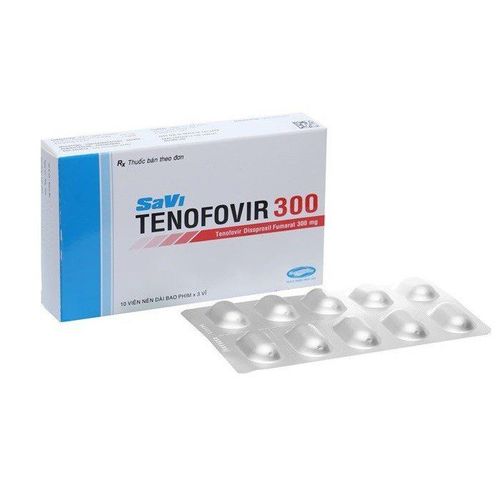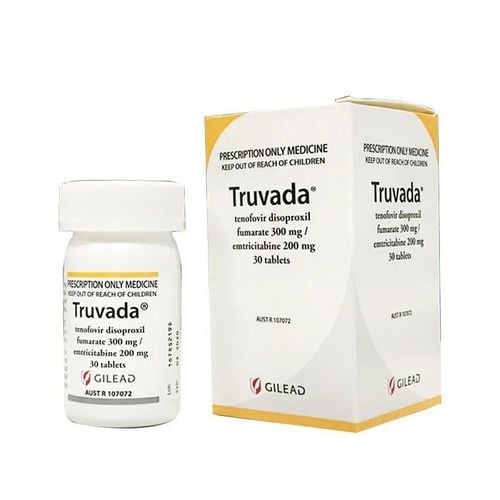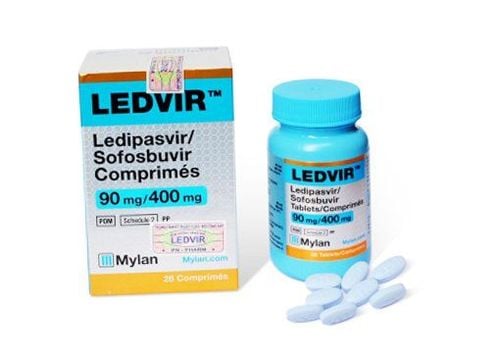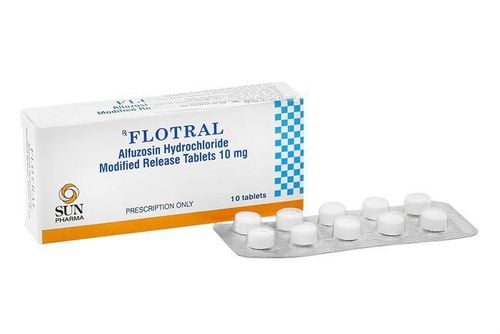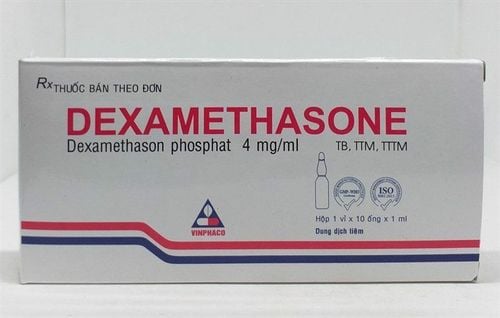This is an automatically translated article.
Orihepa drug is a drug with the main ingredient is Tenofovir disoproxil fumarate, effective in the treatment of chronic hepatitis B, in combination with other antiretroviral drugs in the treatment of HIV infection. Orihepa medicine is a prescription drug, so to ensure effective use, patients also need to follow the instructions of a specialist doctor, and refer to more information about the uses of Orihepa in the article below. .1. What are the uses of Orihepa?
1.1. What is Orihepa?
Orihepa is a drug belonging to the group of antiviral drugs. Oratid medicine has the main ingredient is Tenofovir disoproxil 245mg (in the form of Tenofovir disoproxil fumarate 300mg).Oratid is manufactured at Dong Nam Pharmaceutical Trading Joint Stock Company - Vietnam and has the registration number as QLDB - 387 - 13.
The drug is prepared in the form of film-coated tablets, and packaged. Packed in a box of 6 blisters x 10 tablets.
1.2. What is Orihepa used for?
Indications for use of Orihepa: Inhibits the growth, and replication of the HBV virus from there to treat chronic hepatitis B virus disease in the stage of compensated cirrhosis (not lost yet). Liver function). Support and treatment for people infected with HIV - 1 (do not use drugs alone, need to be combined with antiretroviral drugs). Prevention of HIV infection in people who have been exposed to the pathogen (the drug needs to be used in combination with antiretroviral drugs). Treatment of patients with chronic hepatitis B. Contraindications to the use of Orihepa: Orihepa 300mg should not be used for the following subjects: Patients with hypersensitivity to Tenofovir or any of its ingredients. The patient has severe renal failure. Children under 18. Blood count disorder: Low white blood cell count or abnormal hemoglobin level. Orihepa should not be used in patients who are allergic to the active ingredients. When the patient has any abnormal symptoms, it is necessary to immediately contact the pharmacist or doctor for the most timely advice. Note: The patient must take the drug as prescribed by the doctor, and not self-administer it.
2. How to use Orihepa
2.1. How to take Orihepa
Orihepa should be taken after having a full meal. The drug is taken orally, and taken with water, or can be chewed and not taken with carbonated water, or sweetened soft drinks. Drink 1 time a day.2.2. Dosage of Orihepa
For HIV-infected patients, the dose for treatment is: 1 tablet per day, 1 tablet each time, needing to be combined with antiretroviral drugs. Dosage to prevent HIV infection: Take 1 tablet per day, 1 tablet each time, and need to be combined with antiretroviral drugs, or used immediately when exposed to pathogens and can be used continuously for about 1 month. . Patients with hepatitis B, the dose for treatment is: 1 tablet per day, 1 tablet each time, and should be used continuously for about 1 year (maybe more). Therefore, it is necessary to reduce the dose of Protevir by adjusting the dosing interval and duration in patients with renal impairment and based on the patient's creatinine clearance (CC): CC 50 ml per minute or greater: dosing Usually once a day. CC 30 to 49 ml per minute: dosing every 48 hours. CC 10 to 29 ml per minute: administered approximately 72 to 96 hours apart. Patients on hemodialysis: Each dose should be given approximately 7 days apart or approximately 12 hours after dialysis. Because the safety and efficacy of these doses have not been clinically evaluated, the clinical response to therapy and renal function should be monitored more closely. Patients with hepatic impairment: For patients with impaired liver function, it is not necessary to adjust the dose of 0.1 mg once daily.2.3. Handling missed dose
If in case the patient misses a dose while taking it, take it again as soon as possible (usually it can be taken 1 to 2 hours before the time ordered by the doctor). However, for Orihepa medicine, if it is still within 18 hours, you can take additional medicine.2.4. Treatment in case of overdose
In cases where Orihepa is used in excess of the prescribed dose, the patient should be closely monitored for evidence of toxicity, or symptoms and the body's response to appropriate symptomatic treatment. case is presented. The concentration of free drug in the blood is high, so plasma albumin binding is still loose, so hemodialysis can be used with an extraction coefficient of about 54%.3. Notes when using Orihepa
Dosage adjustment for patients with renal impairment depends on severity. Drugs that can cause adipose tissue proliferation should be used with caution in patients with lipid metabolism disorders. Close monitoring of patients with drug use and a history of pathological fractures or osteopenia is required. Care must be taken when using it for patients with neurological and mental disorders. Before using the drug, read the instructions for use carefully. If the patient needs any more information, they should consult the pharmacist or doctor. To maintain the best antiviral activity, the drug should be used regularly every day and throughout the course of treatment, should be used at the right dose and at the right time. When taking antiretroviral drugs, there may be cases of: Peripheral nerve damage, facial, and mammary gland enlargement. Not all patients need to take Orihepa right away, but only those whose CD4 cell count drops to about 200-350ml will be prescribed the drug. Orihepa cannot kill HIV but only stops its growth, so patients need to take the drug continuously for life. Note: It is always necessary to maintain high levels of the drug in the blood. At low concentrations, it is possible to create drug-resistant viruses. Pregnancy:Currently, there is no research evidence, and no clinical information about the use of Orihepa in pregnant women. However, for these patients, if they want to use it, it is necessary to consult a pharmacist or doctor, and need to weigh the risks and benefits of using this drug. Lactation:
There is currently no information on whether Temofovir passes into breast milk. However, women infected with HIV should not breastfeed to avoid transmission of the virus through breast milk. It is not proven that the drug is excreted in breast milk and can affect the fetus, so it is necessary to carefully weigh the benefits and risks before using the drug in pregnant women. and are breastfeeding.
4. Orihepa side effects
The unwanted effects when in the process of using Orihepa in clinical have been statistically mainly digestive disorders and neurological disorders. Common cases include: pancreatitis, gastrointestinal disturbances, skin rash, and hypophosphataemia. Common cases are: Cough, dizziness, abdominal pain, back pain, arthralgia, fatigue, nausea, diarrhea, flatulence, and dyspepsia, acute renal failure, elevated ALT, loss of appetite, or lactic acidosis,... Elevated serum amylase levels. Other possible side effects are: Headache, peripheral neuropathy, dizziness, depression, insomnia, weakness, and sweating and muscle pain. Increased blood triglyceride levels, elevated liver enzymes, hyperglycemia, and a lack of neutrophils. Renal failure, and proximal tubular effects, including Fanconi syndrome. Lactic acidosis, often associated with severe hepatomegaly and steatosis, is common during treatment with nucleoside reverse transcriptase inhibitors.
5. Orihepa drug interactions
Orihepa drug interactions with other drugs:Orihepa medicine for oral contraceptives: Reduces the effects of Orihepa. Non-Steroidal Painkillers: Increased side effects of both drugs if used together. HIV protease inhibitors or non-nucleoside reverse transcriptase inhibitors: Increases the effect of both when the combination poses a risk of overdose leading to toxicity. Drugs excreted by the kidneys: Leads to the risk of nephrotoxicity, and may lead to renal failure. Orihepa may interact with drugs that reduce renal function or compete for and are excreted by the renal tubules (eg, cidofovir, acyclovir, ganciclovir, valganciclovir, and valacyclovir), increasing plasma concentrations of tenofovir or generic drugs. Orihepa has additive interactions with reverse transcriptase inhibitors and HIV protease inhibitors. Oral contraceptives contain norgestimate and ethinyl estradiol. When Orihepa was co-administered with lamivudine and efavirenz in HIV-infected patients, there was a decrease in the mineral density of the lumbar spine, and an increase in the concentration of four biochemical factors in bone metabolism, an increase in serum parathyroid hormone levels. Orihepa drug interacts with food, and drinks
Currently, there are no scientific studies that show that Orihepa has a case of drug interactions with food and drinks that are dangerous to humans. illness while using these products. However, when taken with a meal that has a lot of fat, it will increase absorption.
6. How to store Orihepa
Each medicine has its own way to store it differently, in order to keep the effectiveness of the drug in the best way. Patients should not use the drug in the following cases: The product is changed to another color, and the box is dented or the case is expired. Medicines should be stored in a cool and dry place, avoiding moldy places, and direct sunlight should shine on the product, should not be stored at too low a temperature such as in the freezer compartment. instructions on how to store the medicine stated in the product's packaging. Keep medicine out of reach of children. Do not dispose of medicine in the wrong place such as: Toilet, or sewer, consult your doctor or local waste company for specific instructions on safe disposal of medicine. Reference source: nhathuocaz.com.vn.




